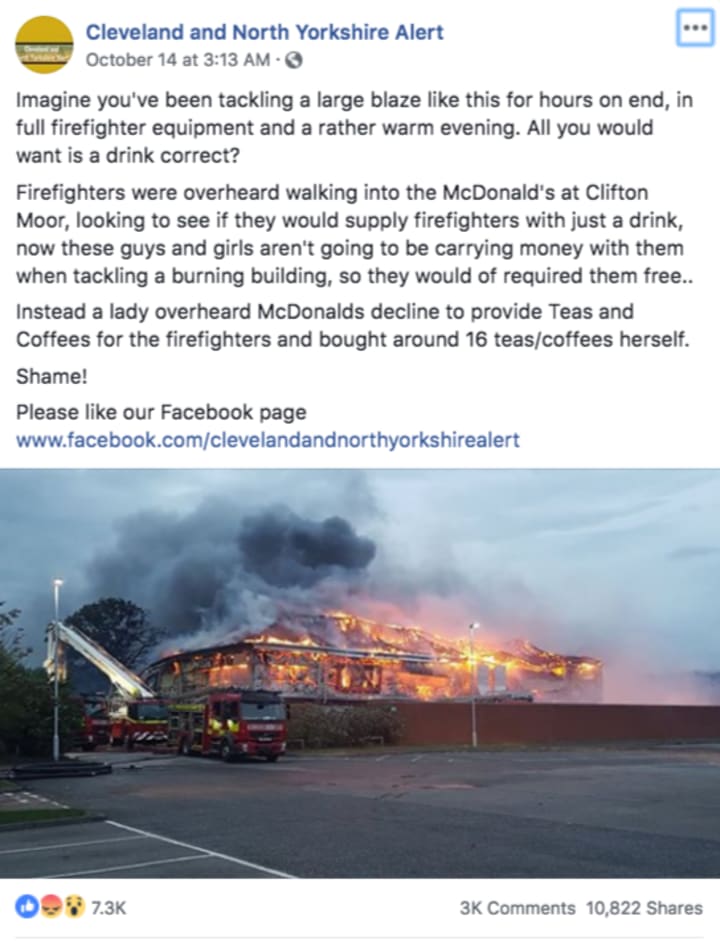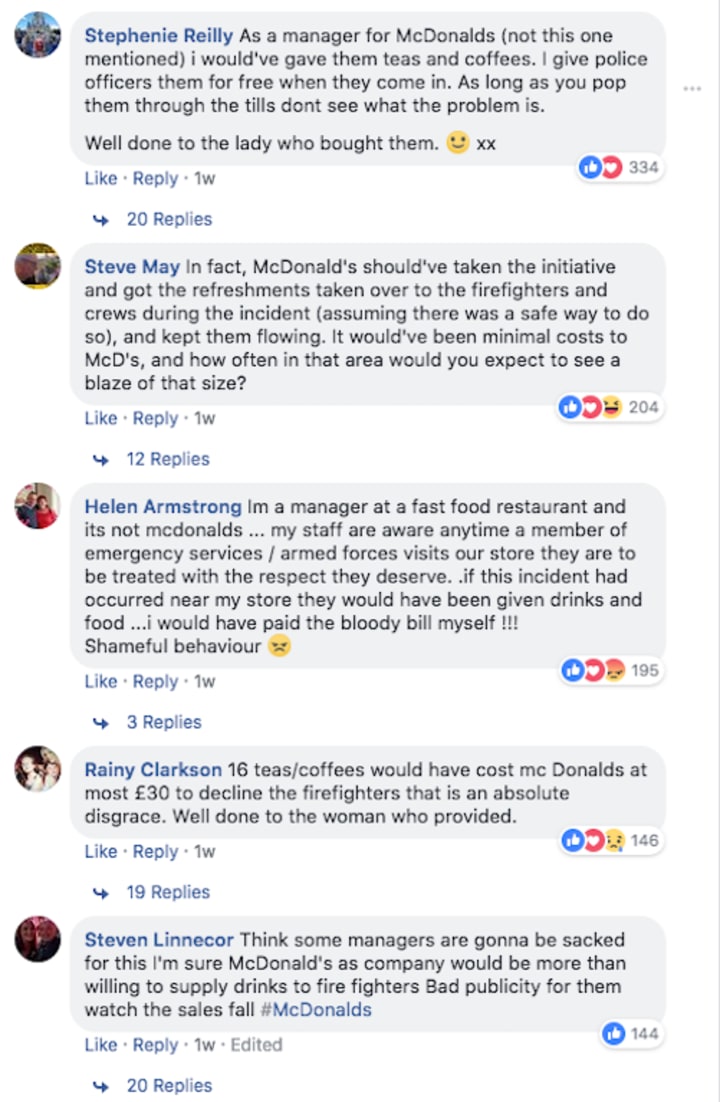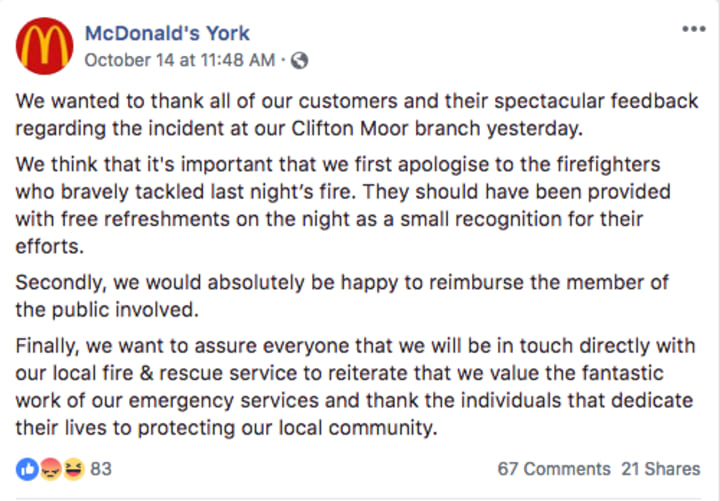The High Cost of Managing Without Flexibility
A 'teachable moment' in building, and maintaining, your corporate reputation from McDonald's.

This is an article about a story that seems to repeat itself almost every day in the 24/7/365, social media-oriented culture that we live in today. Yes, it's an embarrassing, "gotcha" moment—and in this case, it is McDonald's in the crosshairs of people from around the world. Yesterday, it may have been Starbucks and what happened in their Philadelphia location involving two black men who chose one of their locations for a business meeting that led to a corporate crisis, both in terms of public relations and internally with their employees (see below).
This week it is the "Golden Arches," and it is Ronald McDonald that has a black eye in the minds of many members of the public. While this small story will, of course, soon pass from our collective attention— as inevitably happens today when the next story de jour happens. This tale that went viral will have some lasting impact on McDonald's brand and image, and not just in England where it occurred, but to some extent, as in the case of Starbucks' perceived racial incident earlier this year— worldwide.
And tomorrow, it could be Arby's, Walmart, Procter & Gamble, indeed any company who comes into contact with the public, and last time I checked, I think that includes just about everybody! It could even be your own organization— and you, yes you, and your company could suddenly be public enemy #1!
In many cases, this eventuality can come about from merely doing your job and adhering to company policies and procedures. Simply doing things the way that the company has specified that things should— or rather shall be done! It can come about from you or any one of your employees at your location on the front lines making a snap decision as to what needs to be done in a given situation. When facing the ambiguity that is life and when seeing a conflict on what "the manual" or "the system" says that you should do in the circumstances you are presented with in the moment and what you feel that you should, or must, do as a caring, compassionate human being, what is the right call? Do you do what might be morally or ethically right, or do you strictly follow the company policy? And do you and your employees, realize that in that moment, you could be making a decision that might not just be a question of doing something that might risk you reprimand, money or even your job, but are you cognizant that in the world in which we live today, in which everything is being captured, or can be captured, on video, that interaction with a customer or member of the public might just become a viral moment of truth?
Today, such a story can easily, and routinely, make your company the subject of scorn and ridicule around the globe today. And yes, those negative perceptions do stick in folks' minds, and the negative brand perception can steer your customers, both the existing ones and those in the potential pool, directly to your competitors.
The basis of this article is one of those classic, small, stories, that in the days before the internet and social media might have been simply talked about locally in the historic English town where it happened. And while this episode happened at a McDonald's restaurant in York, England, you can just as easily imagine this scene happening down the street at your local McDonald's in in Yorktown, Virginia, Ypsilanti, Michigan, in Yorba Linda, California or in "Anytown, U.S.A."— even ones beginning with other letters of the alphabet. It is something that could happen at any restaurant, full-serve or fast food, but somehow, due to other, shall we say "incidents," that have happened at McDonald's in the past, it is just easier to see it taking place inside one of their restaurants. However, in today's viral world, we should all know, and fully expect, that what happens in York doesn't simply stay in York. And it makes no difference today whether something happens in York or Yorba Linda, the internet and social media can turn your world, and that of your company, upside down with just a few clicks of a mouse or taps on a screen!
The story of all of this incident is quite simple. A massive fire broke-out on a recent Saturday afternoon at a B&M Store, which could be considered an equivalent in the United Kingdom to a discounter like Big Lots or TJ Maxx in the United States. The store was located, was because it basically burned to the ground, in the Clifton Moor Shopping Park, and there is a McDonald's restaurant located adjacent to the retail center.
According to various media sources in the UK (see note at end of this article for attribution), the basic story goes something like this: After fighting the fire for some time, there was a shift change and a number of the exhausted firefighters walked down to the nearby McDonald's. These members of the North Yorkshire Fire Service asked for refreshments, but as was their practice, they did not carry their wallets, or any cash, with them when they were out fighting fires. Being unable to pay, they were refused service by the restaurant's workers, even after they offered to return and pay for their drinks. At least one customer, perhaps two, stepped-up to pay for the firefighters' coffees and teas. And when the story hit social media that the local McDonald's had refused to provide aid to the fire crew that had helped fight a fire in the York shopping center, well, it wasn't a local story anymore— going viral very, very quickly!
The "virality" of the firefighters' story started with a post made by the Cleveland and North Yorkshire Alert on social media. On their Facebook page, this local news group posted the following:

Then, a number of the firefighters involved chimed in on the matter, including both Steve Brown and Phil Lee:

And then, of course, came the angry virtual mob! Here is just a sampling on two of the many, many responses that came both from near and far:



In the discussion that took place on Facebook, even McDonald's managers themselves took issue with how the company's employees and the local supervisor that day acted, and how their decision to refuse to provide the free drinks to the fire crew looked:

Now, to their credit, the local McDonald's there in York did apologize to the firefighters and even offered to reimburse the guests who paid for the crew's refreshments. And even though they did so in less than twelve hours after the first post on the matter came from the Cleveland and North Yorkshire Alert, which is very good, especially on a weekend and especially from a local management, not corporate, the damage had been done as the story traveled far and wide.
Look at the numbers: There were over 7000 reactions, 3000 comments and almost 11,000 shares, to date, of the initial post. In contrast, while the store's apology was indeed widely cited in the British media coverage of the incident, the bottom-line is that the Facebook metrics show that the apology from McDonald's York has drawn but 1-2 percent of the attention of the initial posted complaint about how their store, their management, and their personnel initially handled the firefighter's situation. Likewise the comments made by the firefighters, angry customers, and managers/observers on the matter drew far more interest than the company's social media statement, however quickly it came and however appropriate it was.
And, of course, in the age of social media, the story may have well be "mistold" many times over, and may continue to be, as does happen in the "real world" as well. The net impact than of all of this is that the association of "McDonald's" and "refusing hot, tired firefighters" is one that will linger far beyond the bounds of this English story and far longer than anyone associated with the company would like to think. In a situation that could have been easily handled and been a positive for the company, both in its local community and beyond, the McDonald's employees and their manager on duty chose to take the one course that "blew up" this story! And so while they may have followed a corporate policy to not give away any food or drink at any time, they ended-up costing not just this one location, but the McDonald's brand, a great deal in terms of corporate reputation and goodwill.

Analysis
So what should be your takeaway from this small story that blew up big, as happens so often with companies today, and impacted McDonald’s not just in England, but worldwide? Well, the tale of this anonymous McDonald’s shift manager and his/her employees in faraway York, England truly should serve as a lesson learned for all who manage anyone, anywhere. This is true whether your title happens to begin with a “C” and you have a fancy office and stock options or if your job involves struggling to make out the shift schedule and helping to clean the restrooms. Whether you manage one, one thousand or hundreds of thousands of workers, realize this truth: Yes, the least important person in your organization, wherever they are and whatever they do, can suddenly be the most important person in your company!
It's not just because we live in an interconnected world where what happens one night in a fast food restaurant an ocean away can suddenly become the story of the day with thousands of shares on social media. It's not just because what happens in Peoria, or Prague for that matter, can lead an American customer, either consciously or unconsciously, to perhaps turn into the Burger King or Wendy’s drive thru instead of your restaurant’s location. It's about more than just money. It's about having the right mindset. Call it being emotionally intelligent. Call it having common sense. Call it being human. Whatever label you put on it, the reality is that we who manage need to realize that our actions - and those of the employees who work for us, can and will, be scrutinized like never before. And we need to give ourselves, and every else, both the latitude - and the room, that it takes to try, at least try, do the right thing in those situations that are exceptional, are unexpected, and can’t be planned for (or a policy made to cover them!).
We do live in a world where news, real or fake, trivial or consequential, can spread around the globe in an instant with the click of a mouse or the tap of your phone. Moreover, today we live in an HD, “instant replay” world, where anyone sitting on the couch, in a bar, or in a cubicle expects to have more information, and a better perspective, to be able to make the ultimate decision as to whether a decision made, whether by a referee or by a manager, was “correct.” All decisions are made easier in retrospect. All decisions would be enhanced by having not just the luxury of time, but five angles on what happened. And so, all of us in charge of anything, whether it be in Paris, France or Paris, Texas, are subject to having our best, and our worst, moments on the job scrutinized by “experts” not just within our own company or our own community, but today, around the world.
And so it is easy for anyone of the over seven and a half billion people on the planet, over half of whom have access to the internet, to suddenly make you, your employees, your company the story, for good or for bad. In an instant, your CEO, your company, your local store could be a trending hashtag on Twitter, a popular share on Facebook, and a highly placed story on news websites around the globe. We can dream that we would be trending for doing something good, for going the extra mile for a customer, for a random act of kindness, for an employee singing a cute song on the job, etc. On the flip side, just as quickly, we could see a “nightmare scenario” evolve quite quickly, one where your company becomes the object of scorn, ridicule, and even hate in the world of social media. This can, and has, translated into actual dips in sales, active boycotts by customers, and yes, declines in stock prices. And all of this, all of this can be the result of what, at the time, may seem like the smallest action, the most insignificant of decisions. Today, in the age in which we live, perception, and especially hindsight, is indeed everything!
The point of all of this is not to have you, as a manager curl-up into a fetal position and start crying, thinking about, and dreading, the next time an employee or a manager screws-up, at least in the eye of the beholder, and you and your company go viral in a bad way! Rather, to me, as a management consultant and professor, while this is indeed a cautionary tale, the story does not have to be bad! Indeed, with the right mindset and the right culture, among both managers and employees alike, executives just might hope, even trust, that the next big thing that goes viral about their company would be a positive story— not a source of embarrassment and shame.
Now, for a McDonald’s executive sitting in Oak Brook, Illinois, yes, they might be cowering in fear for the next bad customer service rant or video of a fight breaking out in one of their restaurants going viral. They know that at any one of their thousands of worldwide locations, literally at any time of the night or day, a video could be posted on YouTube of McDonald’s employees doing something bad with a Big Mac or the shake machine. They live knowing that a story could be shared on social media of a restaurant worker refusing service to a policeman, a veteran, or a minority.
This, the fear of going viral, is a reality for many, if not most, executives today. However. It is possible to go on the offense and proactively work to try and ensure that the next time your company is trending on social media it is a good thing, not one that takes your company’s public relations team to DEFCON 1 and presents you with a true moment of corporate crisis.
How do you best work to prevent the bad viral moment from happening in the first place? The answer is amazingly simple. It does not require spending a great deal of money. It does not mean endless hours of training, meetings, and conference calls. It does not require oppressive levels of management direction to try and make sure that everything is done in accordance with an extremely large policies and procedures manual (as measured by either then thickness of the binder or the size of the .pdf file). It does not mean eccentric levels of corporate oversight, with managers hovering over the shoulders of their employees, and their workers feeling inhibited and less human in the way in that they work. This is because they are working afraid, constantly cognizant that their referee/manager will always be there to throw the flag or blow the whistle on even the smallest deviations from the rules.
And if the watchful eyes of human managers was not enough to intimidate workers from doing the right thing when procedures or the manual might say to do another, we have the “Big Brother” factor to add to the equation. Whether it be the “eyes in the sky” cameras positioned to capture what is transpiring second-by-second and/or the technology-enabled metrics that today measure everything in a job, from the time spent with each customer to the time you might spend with a browser open to shop, or to simply read this article, the surveillance society has come to the workplace far, far faster than to society as a whole. And it is just an accepted part of work, and management, today. Sadly, the fear of “tripping up” on a metric, by taking the time to really explain something in a call with a customer or to even assist an elderly customer getting their order out to their car safely, has landed employees on the front lines in trouble due to their being outside the bounds of tolerance in the technology, established by managers, of course, for expected performance.
And then God forbid you might actually want to give something to a needy customer! That could be considered theft, rather than mercy, and well, that will be coming-out of your check!
Now, speaking of God, He actually provided us with the simple leadership advice on precisely how all in any management capacity should approach their roles - regardless of the situation. Not to go Biblical on you, but in this case, it is exactly the reminder that we all need from time to time:
"So the last will be first, and the first will be last."
-------- Jesus Christ, Matthew 20:16
Keep this simple adage in mind as you not only manage the day-to-day, but especially as you work to put policies, procedures and technology in place to govern your employees’ behavior.
In managing, it is really relatively easy to be rigid. The rules are the rules. The policy does not provide for any “wiggle room.” The report says what the report says, and the numbers are the numbers. However, life and managing, is not really meant to be that easy! We must acknowledge that in any business, in any organization, in any government agency, employees and their managers will inevitably be presented with problems, situations, and indeed, opportunities, that fall into what we call the “gray area.”
Now, the Macmillan Dictionary defines this the gray area as “a situation in which the rules are not clear, or in which you are not sure what is right or wrong.” So, you need to make certain that any time you sit down to write or are part of a committee to create a guideline, a policy, a rule, anything that your organization’s employees and managers should do that those statements are “should do’s” wherever possible, not “must do’s” or “shall do’s,” except where absolutely necessary (i.e., “In the event of an emergency, all employees shall open all exit doors and help customers and their fellow workers outside of the building.).
Much of what we do and what we encounter on the job is predictable, and as such, it can indeed be planned for. However, you want to make sure that your managers, and even your front-line employees, are given some latitude, and real support and even forgiveness after the fact if necessary, to work in the “gray area,” and not risk their jobs and their future in the process.
In all likelihood, probably what kept those McDonald’s counter workers and their manager on duty from doing the right thing in this instance was just that— a policy that did not allow for any discretion. No free drinks or free food meant just that to those working in the York McDonald’s that day. None! Ever!No matter if there was a burning building in our shopping center! They obviously did not feel that they had the freedom to deviate from the rules. And yet, this freedom is so necessary today because almost all of us work in jobs that do require us to, in one way or another and with greatly varying frequency, deal with situations that fall into a gray area of one kind or another. Empowering all managers and employees, truly empowering, not just giving “lip service” to doing so, to be able to deal with whatever the situation they may face is therefore ever-so-critical for organizations today. And it is not just about “doing the right thing,” as today, making employees feel like they won’t get fired or have to reimburse the company for giving free drinks to a group of firefighters who have no money and are exhausted from fighting a fire just down the block (and saving your store in the process!) is not just common sense management advice.
Today, this is the smart, realistic, and really, the only way to manage. Yes, taking this enlightened, realistic approach helps ensure that your company, and perhaps even you, aren’t the next trending topic on social media in a bad way! However, it is also just being a good steward, and a good leader, to recognize that there are indeed times that the last will be first, and enabling them to feel like they can do the right, humane thing in whatever the unexpected situation that might present itself at any time. In the crazy, connected, and harried times in which we live, the unexpected should be expected, and you simply cannot manage a McDonald’s, or any other business or organizationm, otherwise! Richard Carlson, in his book by the same name, famously advised managers, and really all of us:
“Don't sweat the small stuff...and it's all small stuff.”
------ Richard Carlson, Ph.D.
And you will not sweat the small stuff, the stuff that happens every day in every job, if you just are able to provide employees with the true ability to think for themselves and to solve problems, and seize opportunities, in the moment, rather than having to think, or even worse, seek out, what the precise managerial directive is on how to handle such a situation and feel like they must, they shall, rigidly follow that guideline, policy, or rule. Life, and business, is simply too complicated today to manage in any other way!
Note: UK Media Sources Used in Preparing This Article
- McDonald’s staff refused to give free drinks to exhausted firefighters at B&M blaze
- Anger after McDonald’s refused free drinks to firefighters tackling huge York blaze
- McDonald's staff are blasted for refusing to give exhausted firefighters free drinks after they put out a huge blaze at nearby store
- McDonald's workers REFUSED to give firefighters free drinks after tackling B&M fire
- York B&M fire: McDonald's sorry for free drink refusal

Tipping is appreciated!
Like what you just read? Did it make a difference to you? If so, please see and share this article through social media, email, and even the old-fashioned way of printing it off for a colleague or friend!
And while you’re at it, as yourself a simple question: Was the info worth a buck or two, or a whole lot more to you, your career, your company? If so, please consider “tipping” (it’s the polite thing to do!) using the easy link below. In providing a small tip, you not only help support the author's work, but you help keep the unique platform that Vocal Media is building be an advertising-free environment, and don't we all need more of that to make our online experiences better today? Please consider showing your support below, and voting for good, ad-free ideas on the Web!
About the Creator
David Wyld
Professor, Consultant, Doer. Founder/Publisher of The IDEA Publishing (http://www.theideapublishing.com/) & Modern Business Press (http://www.modernbusinesspress.com)






Comments
There are no comments for this story
Be the first to respond and start the conversation.